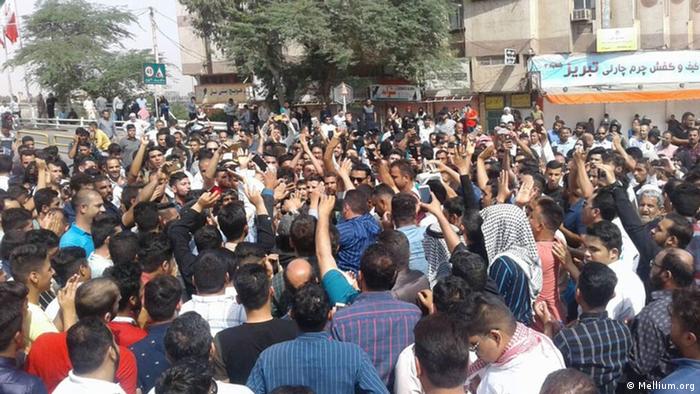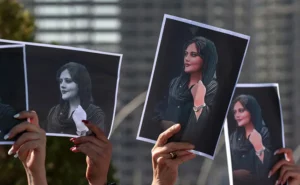برای خواندن این مطلب به فارسی اینجا را کلیک کنید
As Khuzestan enters its seventh day of protests over devastating water shortages, Iranian security forces continue to crackdown brutally on protestors and throttle internet speed to cover up their blatant human rights violations and intimidate their already-suffering population. NIAC unequivocally denounces the actions of the Iranian government in repressing the protests in Iran and implores the Iranian government to halt the violence, honor their basic human rights commitments and provide their citizens with necessities like clean water and electricity.
Protests captured on social media have underscored the dire shortage of water, with many chanting “I am thirsty” or calling for water. Other protesters denounced government officials, including the Supreme Leader. In turn, protesters were met with violence and live ammunition. As of July 21st, 18-year-old Ghasem Khozeiri and 30-year-old Mostafa Naimawi were shot dead, although activists and human rights organizations fear that many more protesters have been killed than is being reported.
In Tehran, other activists and human rights advocates including Narges Mohammadi demonstrated outside the Interior Ministry to express their support for Khuzestan and were arrested on Tuesday, but released a day later. In a video message responding to the protests, Mohammadi said, “We call on law enforcement forces not to harm protesters calling to have access to water.”
The Khuzestani protests erupted on July 15, and were brought upon by a crippling heat wave exacerbated by crumbling infrastructure, poor water management and climate change, sparking a major water crisis and the worst drought Iran has faced in over 50 years. The heat wave, which led to 122 degree Fahrenheit temperatures in some areas, has caused rolling power blackouts across several major cities and water shortages in nearly 300 cities. The arid province of Khuzestan, which has suffered from a prolonged water crisis for decades, has been hit particularly hard, harming agriculture and leaving dams near dry. One lawmaker noted that Iranians in Khuzestan have to wait in line just to purchase water, as clean tap water is largely unavailable.
While the Iranian Constitution is supposed to allow for peaceful protests and marches, state security forces have violently suppressed the protests through the use of indiscriminate and live fire and by conducting arbitrary arrests. In addition, reports have emerged that authorities have once again throttled internet speed in Khuzestan apparently to undermine protesters and prevent information, videos, and footage from reaching the outside world. In November 2019, an internet shutdown coincided with a brutal state crackdown on citizens that left hundreds dead. Videos that have emerged from Khuzestan in the past week are replete with audible gunshots, tear gas, and protesters facing baton-wielding security forces.
NIAC condemns state security forces’ crackdown on the protesters in Khuzestan, who are rightfully calling for access to the most basic of resources: water and power. The ability to protest without fear of retribution, violence, or imprisonment is foundational to respecting the international human rights laws, such as the International Covenant on Civil Political Rights (ICCPR), to which Iran is signatory. Iranian authorities must abide by its human rights obligations by immediately halting their crackdown on protesters and ensuring that the right to free speech and free expression is respected, as is obligated under the human rights covenants it has ratified. It also remains imperative that the Iranian government must facilitate its citizens’ access to basic resources like electricity and clean water, rather than attempting to squash its own citizens for demanding authorities meet fundamental human needs.
Back to top

